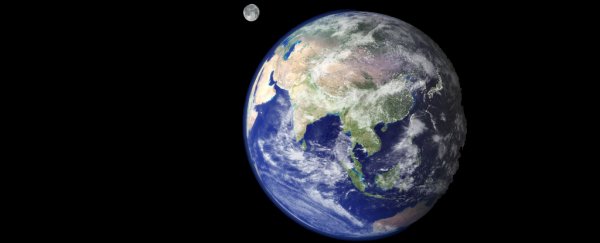So much of humanity's astronomical research is based around the notion of finding something like us out there – whether that's looking for environments that could sustain life, ranking planets in terms of their potential habitability, or comparing distant worlds to our own.
But what if – statistically speaking – the odds are stacked against us finding another planet even remotely like Earth? That's the thinking behind a new study by an international team of researchers, which has taken what we know about the exoplanets that lie outside our Solar System and fed the data into a computer model.
Their resulting calculations, designed to simulate how galaxies and planets have formed over some 13.8 billion years, produces a "cosmic inventory" of terrestrial planets – and one in which Earth very much looks to be unique.
"It's kind of mind-boggling that we're actually at a point where we can begin to do this," one of the researchers, Andrew Benson from the Carnegie Observatories in California, told Shannon Hall at Scientific American.
That said, the researchers acknowledge that their predictions on the spatial and temporal distribution of terrestrial planets in both the local and distant Universe is subject to a range of errors. Especially given how little we know about exoplanets – having only discovered about 2,000 of an estimated 700 quintillion or so.
"It's certainly the case that there are a lot of uncertainties in a calculation like this," said Benson. "Our knowledge of all of these pieces is imperfect."
But why is Earth so special? The researchers don't know, but according to their calculations, our home is something of an anomaly, not resembling the vast majority of other planets in the Milky Way and outside it, which they say are older, larger, and unlikely to sustain life.
Given the incredibly small data set used – even 2,000 exoplanets can be considered a tiny sample to base projections from, given the vast number of potential worlds out there in the Universe – there's no way we can know for sure, but the researchers describe Earth's formation and position as an improbable event of chance.
"[W]e would have to accept that we ended up where we are because of an unlikely lottery draw," the authors write in their paper, which is to be published in The Astronomical Journal. "But maybe there is more to the lottery than we have hitherto realised?"
With these kinds of massive and highly hypothetical calculations, what might refine the predictions could be further discoveries about the composition and position of more exoplanets. Until that time, as the researchers admit, their findings may need to be taken with a grain of salt.
"Whenever you find something that sticks out," one of the team, Erik Zackrisson from Uppsala University, told Scientific American, "that means that either we are the result of a very improbable lottery draw or we don't understand how the lottery works."
